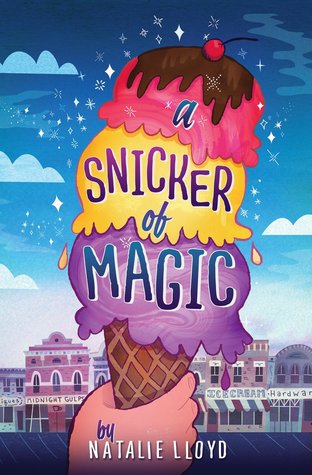Book review of A Snicker in Magic
by Elsa
Here’s another book review by our public relations and social media intern Allison Mulder with her look at how authors approach disability in their stories.
by Allison Mulder
 Until I started reading A Snicker of Magic, I had no idea it featured a character with a disability.
Until I started reading A Snicker of Magic, I had no idea it featured a character with a disability.
Possibly because author Natalie Lloyd doesn’t depict the disability as a huge, interruptive, “inspiring” moral lesson for the main character. Instead, she presents the disability as totally normal.
In A Snicker of Magic, Felicity Juniper Pickle’s mother moves their family back to her old hometown, Midnight Gulch, TN, a town with only faint traces left of the wonders that used to thrive there — “snickers” of leftover magic. One of these traces is Felicity’s ability to see words hovering around her, given off by people and places — “words people are thinking about, or words they want. Some words glow, and some dance. Some have wings, and some have zebra stripes.”
In another case, Felicity’s friend Jonah Pickett hints at having a certain “know-how” for what people will need — though it’s not clear whether this is true magic or just his innate thoughtfulness. Jonah also uses a wheelchair. Why? We’re never told.
Jonah’s disability is depicted with a light touch — sometimes so light that it almost risks the reader forgetting about it. But subtle lines bring us back — a line about getting on and off the bus, for instance — just long enough to remind us before moving on with the story.
I like the way A Snicker of Magic aspires to help normalize his disability. Felicity is never terribly taken aback by the wheelchair. It never turns into some heavy-handed after-school special. There’s even a line where she asks Jonah, “How do you play hockey?”
Jonah starts to answer, “I play my own way…I can’t stand up to hit the puck, obviously, but I can—”
“I didn’t mean that,” she says. “I mean that it’s too hot here. There’s no lake frozen enough to skate on.”
I feel like this tiny exchange says a lot about what Jonah is used to people asking. It hints that his disability is something that affects him every day, to the point that he expects questions to center on his disability, not his feelings. Through Natalie Lloyd’s adept writing, readers learn that Jonah’s disability is not the only thing about his character that’s important. Jonah has a wheelchair. But he also has a father away in the military. He has secret responsibilities helping people in town as an anonymous do-gooder, the Beedle. He has a know-how. He’s a fully fleshed-out character, and I think this would be a great read for someone who wants to see disabilities portrayed without that being the sole focus. Present, though perhaps not explored in great detail.
It’s also a ridiculously cute book, which I enjoyed a lot.
For a taste — or maybe a “snicker” — of the novel, Natalie Lloyd recently wrote a Thanksgiving short story about Jonah that you can read for free. Enjoy!
And if you have any thoughts about how to strike the balance between normalized portrayals of disability or more detailed descriptions of the experience, please share in the comments!






